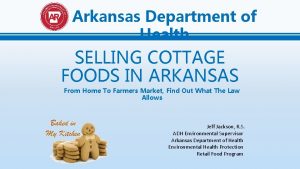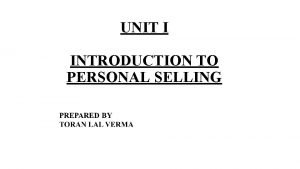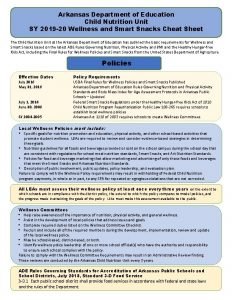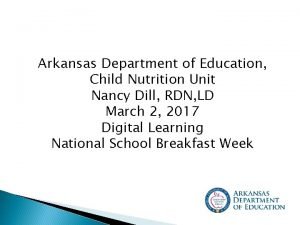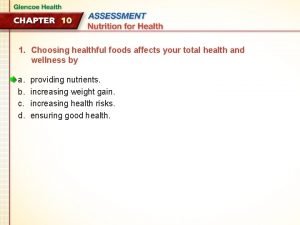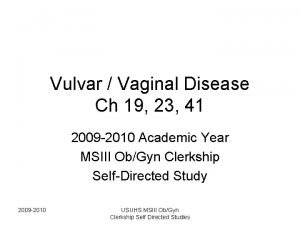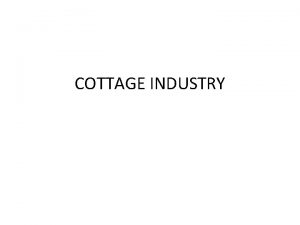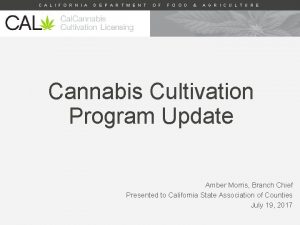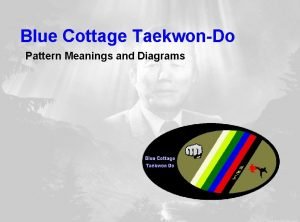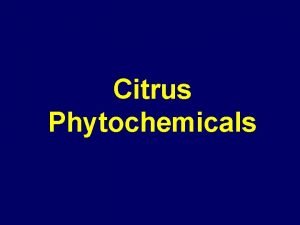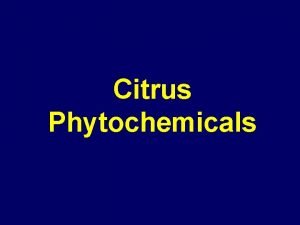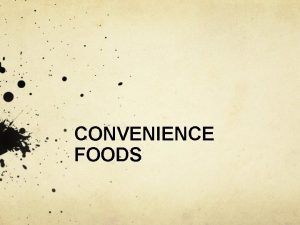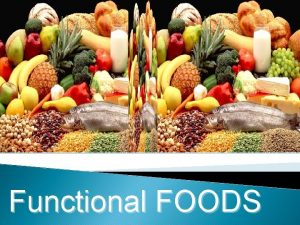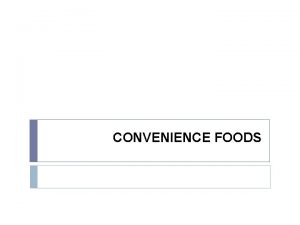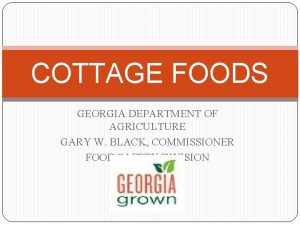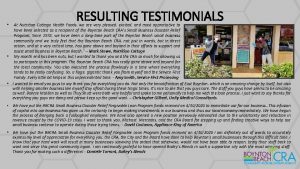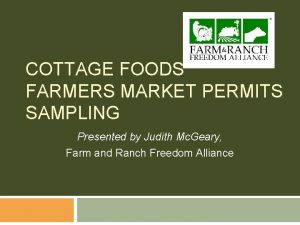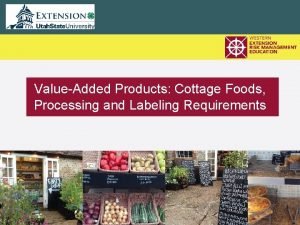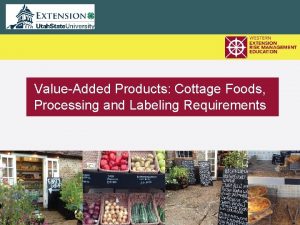Arkansas Department of Health SELLING COTTAGE FOODS IN



















- Slides: 19

Arkansas Department of Health SELLING COTTAGE FOODS IN ARKANSAS From Home To Farmers Market, Find Out What The Law Allows Jeff Jackson, R. S. ADH Environmental Supervisor Arkansas Department of Health Environmental Health Protection Retail Food Program

Cottage Food Law Act 399 of 2017 defines a “Cottage food production operation” as food items produced in a person’s home that are non-potentially hazardous foods such as bakery products, candy, fruit butter, jams, jellies and chocolatecovered fruit and berries that are not cut.

Cottage Food Law Only these products are covered in ACT 399 and are the only products allowed to be sold under ACT 399 of 2017.

Jams, Jellies, and Fruit Butter NOTE: Jams, jellies and fruit butter made with Splenda® and similar sugar substitutes are considered Temperature Control for Safety (TCS) food and may not be sold.

Where Can Cottage Food Be Sold? • Cottage food items can only be sold direct from the manufacturer to the consumer either – from the site where the food is made – At a physical or on-line* farmer’s market – At a county fair – At a special event – At a “pop-up shop” * Internet sales of Cottage Food that are not associated with an online farmer’s market are not allowed.

What is a Pop-Up Shop? • A cottage food operation selling items in an unaffiliated established business for a limited time period with consent of the owner of the unaffiliated established business and the owner or employee of the cottage food production operation being present at the point of sale. • A cottage food operation that operates as a pop-up shop shall not sell or offer for sale foods at wholesale distribution.

What Is Required On The Label? • Each cottage food item shall be clearly labeled and make no nutritional claims. • The label on each food item shall include the following: • Name and address of the person who made it • The product name • The ingredients in the product • And say using 10 -point type “This product is home-produced”

Limitations in the ACT If the food item is not a bakery product, candy, fruit butter, jam, jelly, or chocolate-covered fruit and berries that are not cut or punctured, it is not to be sold as a cottage food item. Standards of Identity for Fruit Butter, Jams and Jellies can be found in 21 CFR 150.

What Can Be Sold?

Raw Fresh Fruits & Vegetables • Whole, uncut fresh fruits • Whole, uncut fresh vegetables

Can Be Sold • • Fresh Farm Eggs Frozen USDA Inspected Meat Maple Syrup Sorghum

Cottage Food/Farmer’s Markets • CAN BE SOLD • Cottage Foods • Farm Fresh Eggs • Frozen USDA inspected meat • Maple Syrup • Sorghum • Whole, uncut, fruits/vegetables • Commercially processed Non-TCS Food

Foods That Can NOT Be Sold Are Not Considered Cottage Foods Should Not Be Sold At Farmers Markets

Jams and Jellies that CANNOT be Sold Jams, Jellies, and Fruit Butters for which there is not a Standard of Identity (21 CFR 150) can NOT be sold as Cottage Food. Examples: • Jalapeno Jelly • Banana Nut Jelly • Bacon Jam • Rose Hip Jelly These foods do not have a low enough p. H on their own to prevent bacterial growth. Thus acid (vinegar or lemon juice) must be added and is critical to the safety of these products. These products are considered “low acid or acidified foods”. Permit is required to produce and sell these items

Cottage Food/Farmer’s Markets • What foods can not be sold at a Farmer’s Market without a permit? – Custard Pies – Dried Fruit/Vegetables/Herbs/Spices – Dried meats – Salsa – Juices – Meringue Pies – Milled Grain/Flour/Meal

What Cannot be sold… • Time and Temperature Controlled For Safety Foods (TCS) Foods • Home Canned Foods • Cheesecake • Cream Cheese based Frosting or Filling • Cream pies and Cream Filled Items • Cured Meats

Cottage Food/Farmer’s Markets • What foods can not be sold at a Farmer’s Market without a permit? – Pickled Vegetables – Fermented Foods (i. e. Kefir) – Salad – Shelled Peas or Nuts – Sliced Fruit or Vegetables – Smoked Meats – Sprouted Beans/Seeds

Cottage Food/Farmer’s Markets • What foods can not be sold at a Farmer’s Market? – Homemade Cheeses – Raw Milk – Wild Harvested Mushrooms

Jeff Jackson, R. S. 501 -661 -2171 4815 W. Markham Little Rock, AR 72205 Frequently Asked Questions
 Cottage law arkansas
Cottage law arkansas Advantage and disadvantage of personal selling
Advantage and disadvantage of personal selling Types of selling situations
Types of selling situations Arkansas department of education child nutrition unit
Arkansas department of education child nutrition unit Arkansas child nutrition unit
Arkansas child nutrition unit Louisiana health standards
Louisiana health standards Which method of preparation tends to make food high in fat
Which method of preparation tends to make food high in fat Yellow cottage cheese discharge
Yellow cottage cheese discharge Secondary process manufacturing definition
Secondary process manufacturing definition Nick carraway cottage
Nick carraway cottage Honeys house
Honeys house White cottage cheese discharge
White cottage cheese discharge Cottage succession planning
Cottage succession planning Define cottage industry
Define cottage industry Specialty cottage indoor
Specialty cottage indoor Taekwondo pattern meanings
Taekwondo pattern meanings Le cottage chamonix
Le cottage chamonix Emma gifford
Emma gifford When did the industrial revolution start
When did the industrial revolution start Matsuo basho haiku in japanese and english
Matsuo basho haiku in japanese and english
